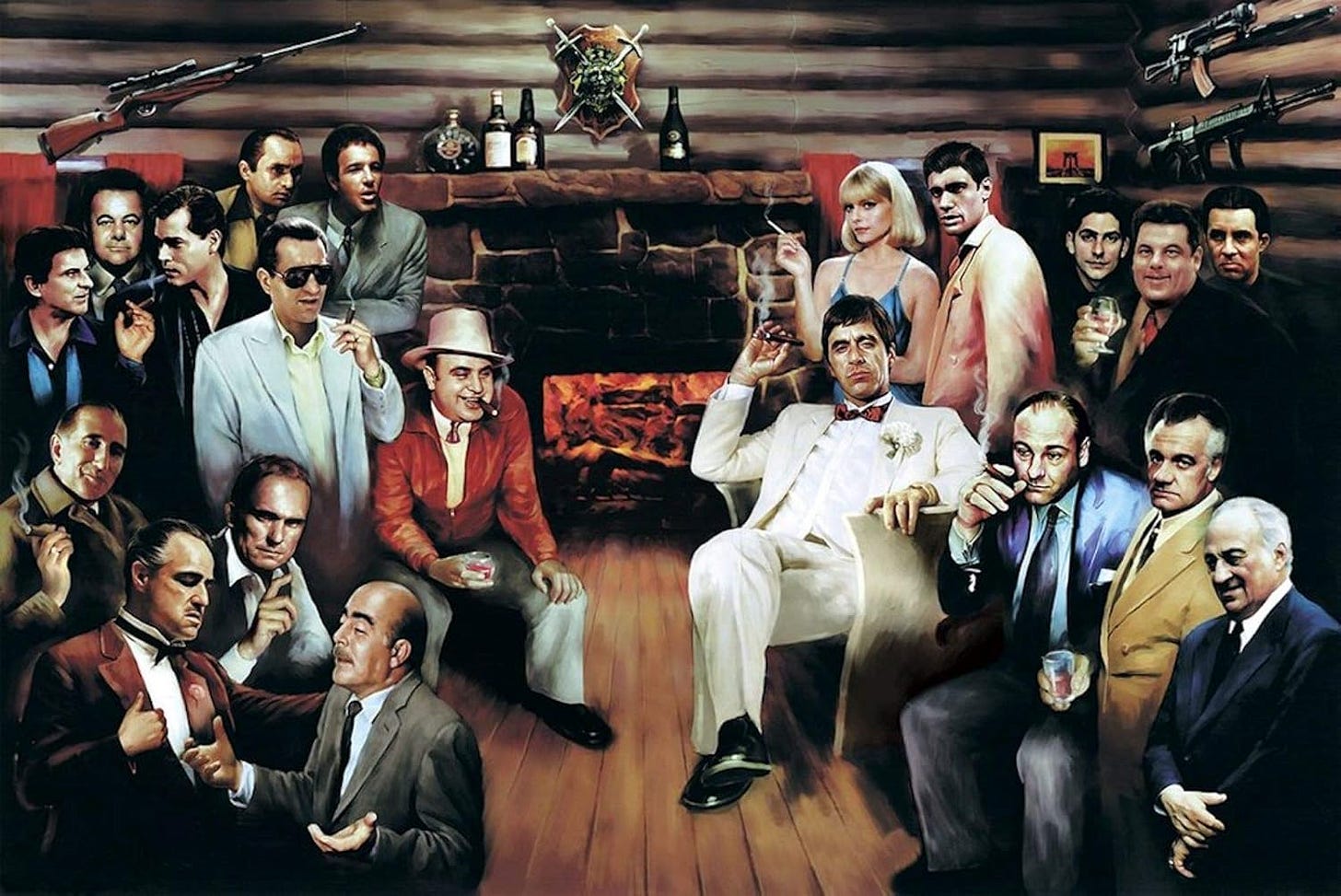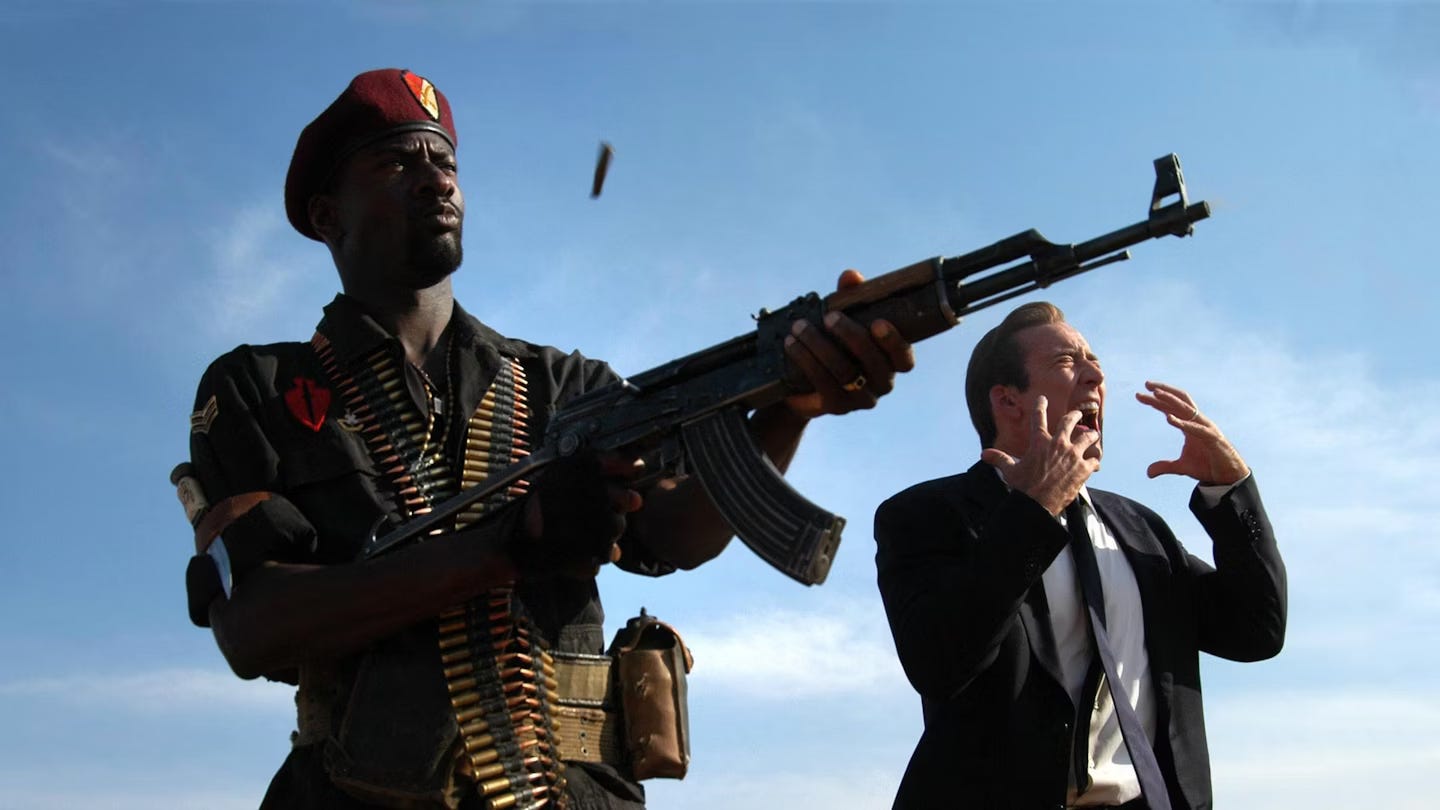The Best Movies and Shows That Explain How Illicit Finance Really Works
A curated list of films and shows that reveal how real-world money laundering, offshore finance, and criminal cash flows actually work—more than just mob hits and drug deals.
Some of you may wonder: What does illicit finance have to do with modern conflict? The answer is simple—everything. From terrorist networks funding attacks via crypto and resource smuggling, to the Chinese state’s use of gray zone financial networks to acquire restricted military technology, illicit finance is the connective tissue behind many of today’s national security challenges.
Heading into the weekend, I thought I’d share something a little different. My fascination with shadow finance started long before I began writing about it—rooted in the films and TV shows I devoured growing up. These stories helped shape how I think about money laundering, corruption, and the global gray economy.
If you want to understand how dirty money actually moves—not just through the streets, but through shell companies, casinos, offshore banking hubs, and fake front businesses—there’s no better primer than watching it unfold on screen.
The films and shows below offer more than drama. They reveal the structure, psychology, and logistics of modern money laundering and illicit capital flows—long before crypto wallets and OTC brokers became household terms.
The Godfather: Part II (1974)
Key themes: Offshore laundering, political capture
Michael Corleone’s Havana playbook mirrors today’s real-world Chinese investment networks in foreign zones. The lesson? It’s not about violence. It’s about how power makes money disappear.
“They can win” - as perfect a scene for understanding militant groups in the 20th century as it is for the 21st.
Casino (1995)
Key themes: Skimming, front companies, surveillance evasion
Think of the Tangiers casino as a real-world Cambodian crypto-junket. Watch the way cash is moved, scraped, and laundered — it’s still happening today, just on blockchain. The movie also shows the enormous problem posed by loose cannons in a criminal network.
“For guys like me, Las Vegas washes away your sins”
Donnie Brasco (1997)
Key themes: Social trust, economic micro-networks
Loyalty is the primary currency of crime: everyone eats, or no one does. Understanding the personal side of laundering is crucial to understanding Chinese gray zone cash cycles.
Goodfellas (1990)
Key themes: Everyday laundering, lifestyle inflation
The real drama wasn’t the heist — it was a job. Front businesses weren’t just covers; they became extensions of identity. The dry cleaner. The seafood importer. The tiki bar. Behind each facade was a person trying to blend in while building something off the books. Today, it’s not fur coats and briefcases — it’s shell LLCs, crypto wallets, and “consulting gigs” on Telegram. The laundering hasn’t disappeared; it’s just evolved into everyday life.
One of the greatest long shots in cinematic history, it also illustrates how criminal networks penetrate the legitimate world with ease
Layer Cake (2004)
Key themes: Exit strategy, white-collar transformation
The criminal elite wants out — into hedge funds, real estate, and biotech. This is what oligarchs, cartel families, and political launders really want: legitimacy.
Welcome to the layer cake, son
The Laundromat (2019)
Key themes: Systemic laundering, shell firms, legal crime
This is the Panama Papers, dramatized. Less violence, more spreadsheets. The real laundering is done in boardrooms — not back alleys. Maybe not the best movie out there, but definitely not the worst either.
“More than anything else, our clients expect one thing from us: privacy”
The Sopranos (1999–2007)
Key themes: Front businesses, money sinks, generational finance
What makes The Sopranos great isn’t just mob drama — it’s the way Tony launders through sanitation, strip clubs, and construction bids. This is how old-school crime survives regulation. The surreal dream sequences, running themes, and amazing performances also make it cinematic masterpiece that redefined television.
Also, I loved the ending and don’t care who know it!
Breaking Bad (2008–2013)/ Better Call Saul (2015–2013)
Key themes: Smurfing (dividing small transactions into smaller ones), structuring, cash business
Walt’s car wash and cash stacks show you what happens when the money gets too big for the street. Saul explains it to Jessie perfectly. It’s also a lesson in how scale = risk = creativity under pressure.
Saul teaching Jesse about money laundering is one of my favorite scenes in the Breaking Bad universe
Scarface (1983)
Key themes: Cash overload, laundering failure, criminal hubris
This is what happens when the money comes too fast and the systems can’t keep up. Tony Montana builds an empire but never figures out how to clean it. Front businesses buckle, banks back off, and the piles of cash become a liability. The lesson? In illicit finance, scale without structure leads to collapse.
“We’re not a wholesale operation, we’re a legitimate bank. The more cash you give me, the harder it is for me to rinse”
Lord of War (2005)
Key themes: Arms trafficking, laundering as lifestyle, state complicity
This is gray finance with a body count. The deals are flashy, but the real tension is in making dirty money look clean. This one also digs deep into the supply chains that move smuggled goods around the world: falsified origin certificates, rickety old planes with shady pilots – it’s all there.
Although it’s one of Cage’s tamer performances, it’s still lots of fun
Trailer Park Boys (2001–2018)
Key themes: Small-time scams, front businesses, informal economy
Booze, dope, and driveway grow-ops—TPB shows the low-end of the laundering spectrum. The Sunnyvale crew runs a revolving door of half-baked front businesses to wash cash and stay ahead of the law. It’s funny because it’s real: most laundering isn’t billionaire wire fraud, it’s liquor stores, vending machines, and parking lots that don’t make sense on paper. Although hilarious, it’s also a really great exploration of the criminal psyche - especially through Ricky, one of the greatest characters in the pantheon of Canadian television IMHO.
The show’s setting in the Canadian maritimes hits close to home for me: my friends and I started watching in high school before it really took off. We even went as Ricky, Julian and Bubbles for Halloween (I was Bubbles).
In one episode, Ricky exploits Canada’s Youth Justice Act by having young kids from the Junior Achiever’s Program steal barbecues for him. It’s just perfect.
🧠 Why These Matter
These aren’t just entertainment — they’re case studies.
From Havana hotels to Albuquerque car washes, they reveal the psychological, social, and financial systems behind laundering.
If you’re looking at:
🇨🇳 Chinese gray finance
💵 Crypto laundering networks
🏗️ Infrastructure fraud across the Belt & Road
🛂 Shell companies and jurisdictional arbitrage
💣 Terrorist finance and the crime-terror nexus
Then you’re watching real-world extensions of these stories. If you’re looking for something to put on this weekend, you can’t go wrong with any of these. Comment if I missed one!





Even though I am not surprised by Putin’s move towards Elon, it’s scary stuff!